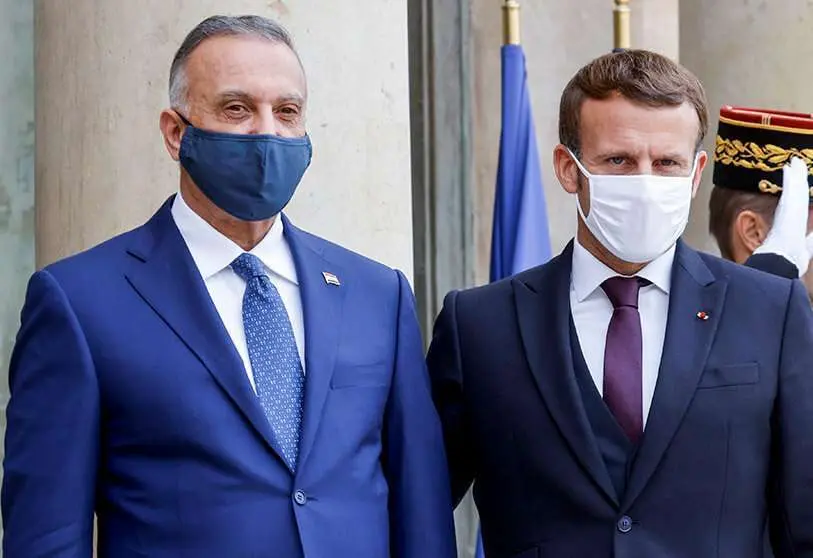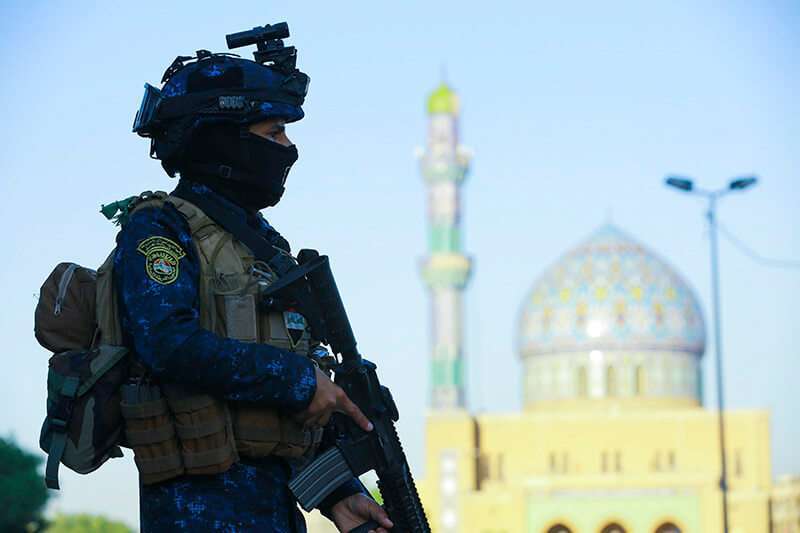Macron pledges to Iraq to continue supporting the fight against Daesh

Jihadist terrorism has never ceased to be present in our world. The viral waves of Daesh in 2014 have been silenced by the media to avoid propaganda messages. But the existence of this terrorist organisation and its activities have not stopped either in the Middle East or in Europe.
The French president, Emmanuel Macron, has promised the Iraqi prime minister, Mustafa al-Kazemi, that his country will continue to be involved in the international coalition against Daesh, as stated by the Elysée Palace in a communiqué issued in the early hours of the morning.
At a meeting held on Monday in Paris, the two leaders "stressed the need to continue the fight against terrorism", stressed the French presidency. Macron showed his willingness to deepen bilateral relations with Iraq in the field of defence and supported Al-Kazemi in the measures to "put an end to the unacceptable attacks" that have been suffered by diplomatic missions in Iraq in recent weeks.
The French president indicated that France will renew its contribution to the UN Mine Action Service (UNMAS) in Iraq this year and announced that it will make a contribution of one million euros to the United Nations Assistance Mission for Iraq (UNAMI). This mission offers assistance to the Iraqi institutions in view of the early legislative elections announced by the Prime Minister.
Al-Kazemi, for his part, condemned the assassination of the French history professor Samuel Paty by a Jihadist of Chechen origin who beheaded him in a town on the outskirts of Paris. The professor had suffered a campaign of attacks on social networks because of a course on freedom of expression in which he had taught his students the controversial Muhammad cartoons from Charlie Hebdo magazine.
The terrorist group Daesh, also known as the Islamic State of Iraq and the Levant, is a paramilitary group of Wahhabi Jihadist nature that follows a doctrine of Sunni Islam formed by radicals loyal to Abu Bakr al-Baghdadi. The leader, who was murdered in November 2019, self-proclaimed a Jihadist caliphate in the Iraqi city of Mosul in 2014. As a caliphate, he proclaimed his authority over the entire Muslim world in religious, political and military matters.
Since then, Iraq has been fighting this group tirelessly. This organisation has been labelled a terrorist group by the United Nations, as well as by several countries including France. Daesh is known for his videos of decapitations and other types of executions of soldiers and civilians, journalists and humanitarian aid workers. He has also carried out the destruction of historical sites with a valuable cultural heritage.
The UN holds Daesh responsible for human rights abuses and war crimes. In Iraq, he is known for carrying out "ethnic cleansing", as he is called, on a large scale in the northern territories. The terrorist organisation originated as Ŷamaʕat al-Tawhīd wal-Ŷihād, strengthening its alliance with al-Qaeda and participating in the Iraqi insurgency after troops from the United States, United Kingdom and other Western countries invaded Iraq in 2003.
The first city Daesh came to control in Iraq was Falluja in January 2014. But Falluja was finally recaptured by the Iraqi Army supported by air strikes from Russia on 17 June 2016 after several weeks of military offensive.
Today the terrorist faction has reduced its devices and lost the organisational body it had in 2014, but it continues to fight for its caliphate. The countries involved in this mess, such as Iraq, have called for international assistance to put an end to this threat.

At the beginning of October at least four policemen were killed in an attack carried out by alleged members of the Jihadist group Daesh in the province of Kirkuk in northern Iraq.
The Media Security Cell stated that the attack resulted in two officers being injured and was perpetrated against a police brigade in the district of Hauiya, the scene of several attacks by the Islamic state in recent months. The head of the police, Fatah Hussein, confirmed what had happened and said that reinforcements would be deployed in the area.
Furthermore, the People's Mobilisation Forces (PMF), a coalition of pro-government militias, mainly Shia, have been the target of a missile attack by Daesh in the vicinity of Al-Madan in the province of Diyala, east of Baghdad. The FMP have stressed that they responded with artillery fire, causing the attackers to flee, adding that the event had ended without any casualties.
On 9 December 2017 Iraq declared the "end of the war" against Daesh in the country, after the military recovered the last bastions that were still under the control of the Jihadist organisation.
However, Daesh has continued to perpetrate attacks practically every day in different parts of the country, including Baghdad and its surroundings, leading the authorities to launch various operations against the group in various parts of the country.
The European Union yesterday renewed the sanctions scheme against individuals and companies linked to the Daesh and Al-Qaeda, so the measures will remain in force until October 2021. As the Council recalls, the regime is independent but complementary to that adopted at UN level.
The existing regime was adopted in 2016 when the European bloc took autonomous restrictive measures against Daesh in the midst of its offensive in large parts of Syria and Iraq. In the case of the sanctions against al-Qaeda, the former date back to 2002 following the attack on the Twin Towers and the Pentagon in the United States.
With this mechanism the EU-27 are maintaining sanctions against five people, the EU Council has reported, including European Jihadist fighters. Specifically, it covers the freezing of assets and prohibition of entry into the EU for individuals and the seizure of accounts for groups and entities.








